Book contents
- Frontmatter
- Introduction
- 1 Literacy, books and readers
- TECHNIQUE AND TRADE
- COLLECTIONS AND OWNERSHIP
- READING AND USE OF BOOKS
- I BOOKS FOR SCHOLARS
- II PROFESSIONS
- 18 The canon law
- 19 The civil law
- 20 The books of the common law
- 21 Medicine and science
- III THE LAY READER
- Appendix
- List of abbreviations
- Bibliography
- Photo credits
- General index
- Index of manuscripts
- Bibliographic index of printed books
- Plate Section"
- References
21 - Medicine and science
from II - PROFESSIONS
Published online by Cambridge University Press: 28 March 2008
- Frontmatter
- Introduction
- 1 Literacy, books and readers
- TECHNIQUE AND TRADE
- COLLECTIONS AND OWNERSHIP
- READING AND USE OF BOOKS
- I BOOKS FOR SCHOLARS
- II PROFESSIONS
- 18 The canon law
- 19 The civil law
- 20 The books of the common law
- 21 Medicine and science
- III THE LAY READER
- Appendix
- List of abbreviations
- Bibliography
- Photo credits
- General index
- Index of manuscripts
- Bibliographic index of printed books
- Plate Section"
- References
Summary
For much of the Middle Ages, philosophers differed over whether medicine could be counted as a true science, or a mere mechanical art. Some argued for the dignity of medical philosophy; others for the degrading character of the practice of medicine. Learned physicians themselves liked to characterize medicine as both science and art – and indeed argued that this duality distinguished medicine above other subjects, which could only pretend to be one or the other. Medicine could not just be left to the philosophers, and at the same time those who practised medicine without knowledge of the true principles were ignorant empirics. So, even as scholastic medicine achieved its zenith in the fourteenth century, and flourished in the European universities, there were always two sorts of medical literature, one reflecting the study of theorica and practica as a university subject, and another which provided the practitioner with guidance on diagnosis, preventive medicine, materia medica and therapeutics. Since many, if not most, of those who taught at universities also practised, they were authors as well as consumers of both sorts of literature.
Before about 1375 most medical books owned and used in Britain would have been in the first category, books to do with the university study of medicine. A great change then took place, however. In effect, medicine and science as transmitted at the universities leapt the walls and found a readership outside. We can register this change by looking at the numbers and kinds of texts written; by looking at the change in language use for medicine and science; and by looking at the selection and editorial processes involved in the creation of new manuscripts.
Keywords
- Type
- Chapter
- Information
- The Cambridge History of the Book in Britain , pp. 433 - 448Publisher: Cambridge University PressPrint publication year: 1999
References
- 2
- Cited by



